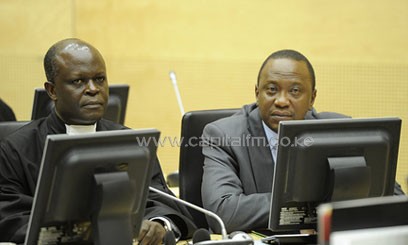Media ejected from Uhuru, mobile operators’ case

The media was asked to leave the courtroom following filing of the request by Kay, to ensure that the proceedings were kept secret/FILE
The media was asked to leave the courtroom following filing of the request by Kay, to ensure that the proceedings were kept secret.
Kay, who is represented by Ogetto, Otachi and Company Advocates, wants access to certain information from the two mobile providers but it is still unclear what he is after.
Reports in sections of the press on Tuesday suggested that Kay wants the two mobile operators held to account for allegedly sharing private mobile data with the International Criminal Court (ICC) Prosecutor Fatou Bensouda, to assist her in the case she has against three Kenyans including the Head of State, his Deputy William Ruto and former radio personality Joshua arap Sang.
Kay, who is appearing for the President in his ICC trial, filed the cases on different days before Justices Isaac Lenaola and David Majanja at the Milimani Law Courts.
Chief Registrar of the Judiciary Gladys Shollei later sent a statement to newsrooms saying that the High Court would make its decision public once the case was concluded and only if it does not undermine the integrity of the ongoing trials at The Hague.
“The Judiciary would like to inform members of the public that information of the case in question before the Constitutional Division and Human Rights Division will be released after conclusion of the case and only if it does not affect the integrity of the ongoing trials at The Hague,” she stated.
She added that the High Court had a right to conduct some sessions in camera, depending on the nature and sensitivity of the proceedings.
Shollei particularly cited the publicity that would follow the high level case arguing that it could put the interests of justice at risk.
“In such matters, decisions, rulings and judgment may be pronounced publicly but the press and public may be excluded from all or part of the proceedings to the extent strictly necessary in the opinion of the court in special circumstances,” she said.
She maintained that the court was tasked with protecting the well being of individuals, families, communities as well as the nation and would in no way abdicate that responsibility.
“Therefore the Constitutional and Human Rights Division like any other court has at times heard matters not in open court but in-camera as dictated by the interests of justice as determined by the nature of the proceedings,” read a statement signed by Shollei.
“Interests of justice require the courts to consider particularly the security of the witness(s), and the integrity of related proceedings.”

